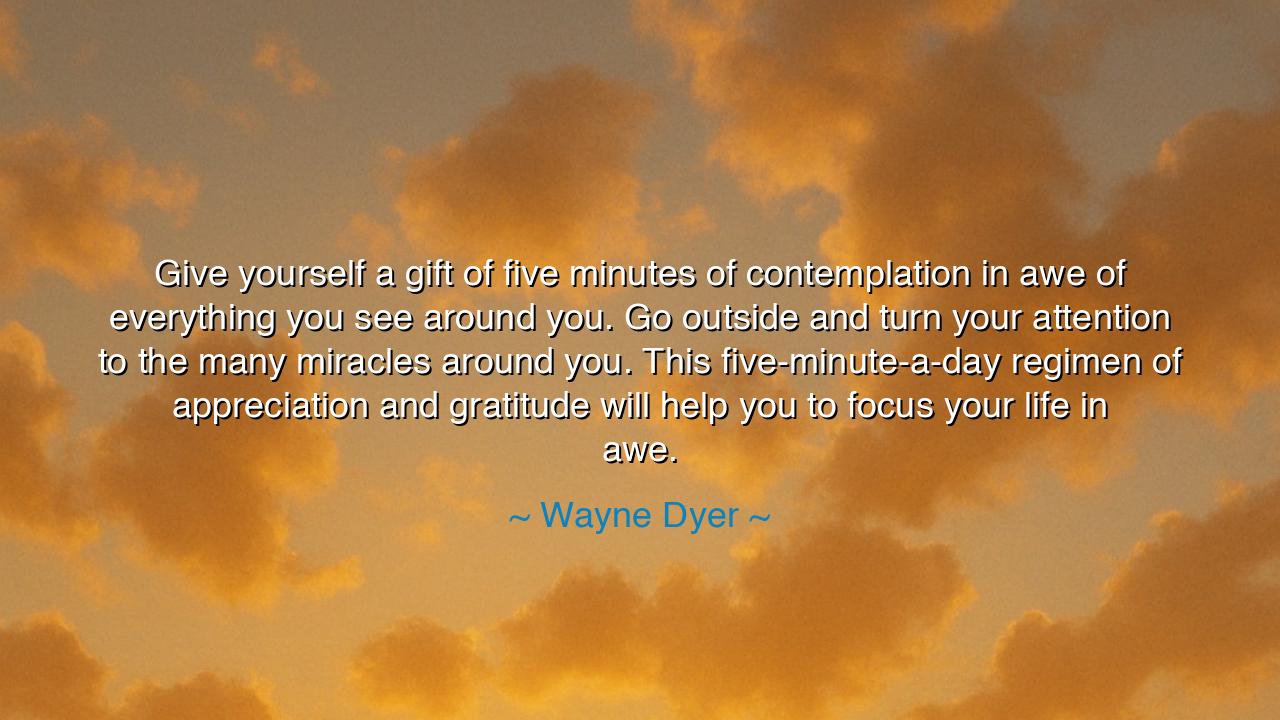
Give yourself a gift of five minutes of contemplation in awe of
Give yourself a gift of five minutes of contemplation in awe of everything you see around you. Go outside and turn your attention to the many miracles around you. This five-minute-a-day regimen of appreciation and gratitude will help you to focus your life in awe.






Hear, O children of the fleeting hour, the words of Wayne Dyer, teacher of the inner life, who declared: “Give yourself a gift of five minutes of contemplation in awe of everything you see around you. Go outside and turn your attention to the many miracles around you. This five-minute-a-day regimen of appreciation and gratitude will help you to focus your life in awe.” In these words is a fountain of wisdom, urging the soul to pause in its endless rushing, to look upon the world not with weary eyes but with the gaze of wonder.
The origin of this saying lies in Dyer’s lifelong work as a spiritual guide. He believed that transformation did not require mountains to move or heavens to open, but small, daily choices of awareness. By commanding us to give just “five minutes,” he revealed a truth: that even the smallest act of contemplation can shift the heart, opening it from restlessness to stillness, from complaint to gratitude. It is not in grand gestures, but in quiet practices, that the soul is renewed.
Consider the wisdom of awe. Awe is the recognition that we live in a world greater than ourselves, filled with mysteries we cannot explain. The rising of the sun, the flight of a bird, the unfolding of a flower—these are not ordinary, though we treat them so; they are daily miracles. To contemplate them, even for a breath, is to be reminded that life is not barren routine, but an unending gift. Awe humbles pride, lifts despair, and plants the seed of joy in the soil of the heart.
History gives us witness. The great Albert Einstein, though a man of science, spoke often of wonder. He said that he who no longer pauses in awe at the mysteries of the universe is as good as dead. For Einstein, the laws of physics were not dry equations but gateways to the miraculous—proof that order and beauty were woven into the fabric of creation. His genius was not born of intellect alone, but of a heart attuned to wonder. He saw what Dyer counsels us to see: that to live in awe is to live fully.
Think also of the monks of old, who in their cloisters paused each day to give thanks for the simplest things: bread, water, light, breath. Their lives were often poor in possessions but rich in gratitude. And in this gratitude they found a joy that kings and merchants could not purchase with gold. So too can we, in our restless modern age, find peace not by grasping for more, but by learning to see what already surrounds us.
The meaning of Dyer’s teaching is therefore both simple and profound: we shape our lives by what we attend to. If we fix our eyes only on struggle, life becomes burden. But if we turn our attention to miracles, however small, life becomes blessing. Five minutes of daily awe is not wasted time, but the sharpening of vision, training the soul to behold beauty in every place, even in sorrow.
The lesson is plain. Pause each day to step outside of your troubles. Look at the sky, the trees, the faces of those you love. Acknowledge the miracle of your own breath, your own heartbeat. Give thanks not once a year, but every day, in small doses that steady the spirit. And as Dyer promised, this practice will not merely soothe you, but focus your life—guiding you toward humility, resilience, and joy.
Thus let his words be carved into memory: “Give yourself a gift of five minutes of contemplation in awe.” For awe is not luxury but necessity, the breath of the soul. Practice it, live it, and your days, though brief, will shine with the radiance of eternity.






AAdministratorAdministrator
Welcome, honored guests. Please leave a comment, we will respond soon